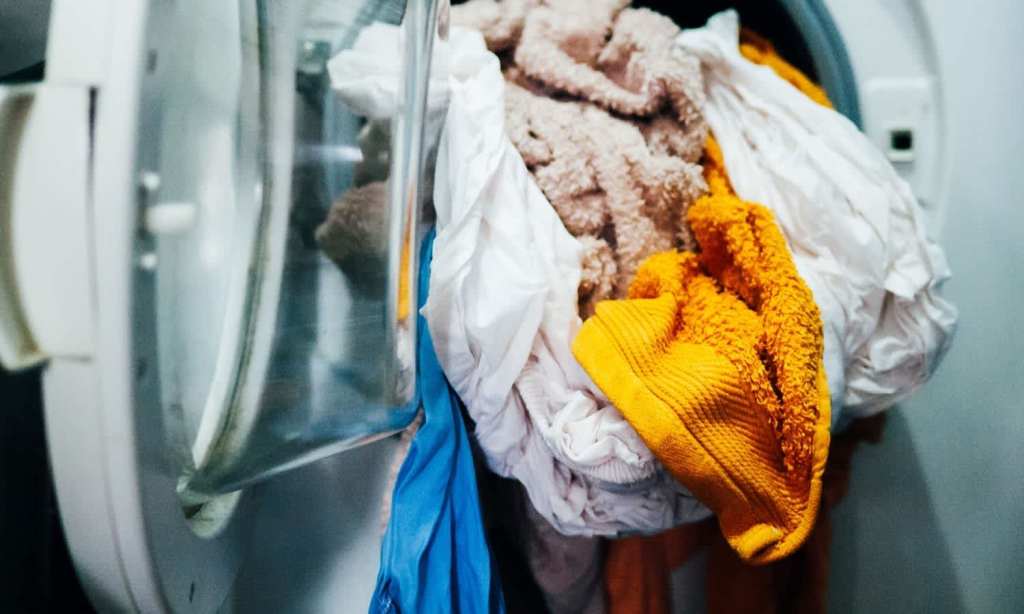Clothes can have a big impact on the environment, both in terms of when we’re washing and drying them and when we’re done wearing them and tossing them — oftentimes, far too soon. In fact, research by home appliance brand Electrolux from 2020 found that 9 out of 10 clothing items end up in landfills before they should and that a whopping up to 10% of the world’s annual CO2 emissions are linked to the fashion industry.
The good news is that the fashion industry is already onto it. “More recycled fibres are coming, including new-gen materials made from bio-waste streams such as wheat straw and cotton waste from worn-out clothes,” says Clare Press, former Sustainability Editor at Vogue Australia and current host of podcast Wardrobe Crisis and co-host of Ethical Fashion. “Brands are increasingly considering a fabric’s carbon and water footprints as well as aesthetics and performance.”
But while the brands are doing their part, what can we do to lower our garments’ carbon footprint? Ahead, Press shares five things we can start doing today.
Lower the Wash Temperature
Turns out washing clothes in 30-degree water, instead of 40, can reduce energy consumption by up to 35%, Press says. “I have been washing bed linens and towels at 30 degrees for years now, and it works a treat,” she says. “And generally, I wash everything on low temperatures.”
Consider If the Item Actually Needs to Be Washed
Next is to not waste cycles on just a few bits and bobs and instead, to wait for a full load, Press says.
“We’re washing things like jeans and sweatshirts when they’re not properly grubby. Also, we’re sending dresses and outerwear to the dry cleaners when they’re really just in need of steaming. While good dry cleaners are improving their processes, many still routinely use harsh chemicals, which aren’t great for the fibres in our clothes or the longevity of a garment.”
Don’t Just Throw Everything in the Laundry
Press also suggests generally being a more mindful washer – using common sense and paying attention. “We’ve all had the black-shirt-in-a-white-wash experience — accidents happen,” she says. “But you can avoid trashing loved clothes in the wash by taking a few moments to consider what they are made of and how they are sewn before washing them. Look at things such as – do they have delicate embellishments? Are they strong colours you’ve never washed before?”
Press also notes that in order to protect themselves should anything happen to the garment, my brands will add a ‘dry clean only’ label onto clothing that can happily be machine washed in a delicate wash setting.
“The tricky thing is that some garments are indeed best dry cleaned — I mean don’t get washing that tailored overcoat and blaming it on me — so this involves a bit of effort on your part. Doing research on your machine’s functionalities, using your common sense, testing some things.”
Consider a New Washer
Obviously, not everyone can afford to upgrade their appliances, but when you can, it will make a real difference when it comes to energy and water savings by buying a new-gen intelligent machine, Press says.
“For instance, Electrolux washing machines have a function called SensorWash that automatically figures out how dirty your clothing is and adjusts the detergent levels and washing times accordingly, all with energy efficiency and an aim of reducing unnecessary wear on fabrics in mind.”
Opt for Liquid Detergent Over Powdered
And finally, Press says when it comes to your laundry habits, you can be more sustainable by buying eco-friendly detergents (it’ll say on the packaging) and also considering the packaging itself it comes in.
“Choosing liquid detergent can be a safer option for washing coloured clothes because many powdered detergents contain bleaching agents,” she says. “And also, using fabric softener can increase the strength of clothing fibres and make them last longer.”
Re-stor, which is stocked in certain Woollies, are dissolvable, pre-measured laundry sheets, which you simply pop into the wash with your clothing, saving you from creating extra plastic waste.
Read more stories from The Latch and subscribe to our email newsletter.







